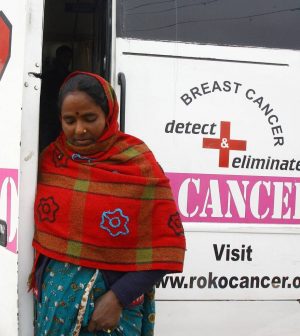- Finding Unshakable Power in a World That Wants to Pull Us ApartPosted 6 months ago
- What could a Donald Trump presidency mean for abortion rights?Posted 6 months ago
- Financial Empowerment: The Game-Changer for Women in Relationships and BeyondPosted 7 months ago
- Mental Health and Wellbeing Tips During and After PregnancyPosted 7 months ago
- Fall Renewal: Step outside your Comfort Zone & Experience Vibrant ChangePosted 7 months ago
- Women Entrepreneurs Need Support SystemsPosted 7 months ago
Women sacrifice their health to shield families from spiking costs

By Nita Bhalla | Thomson Reuters Foundation Newsroom
What’s the context?
Women are skipping meals, medical appointments and treatments in order to make ends meet as living costs rise worldwide.
~ Rising inflation is widening gender gaps, say charities
~ Women report skipping medical care to feed families
~ Campaigners sound alarm over government austerity measures
NAIROBI – When the pain started in Agnes Wachira’s chest almost six months ago, the Kenyan mother-of-three dismissed it as a symptom of the daily grind of working long hours hand-washing clothes in the narrow lanes of Nairobi’s Kawangware informal settlement.
Over the months, the ache has developed into a persistent tightness across her chest, often leaving her breathless.
Yet with Kenya’s inflation running at a five-year-high of 8.5%, the 48-year-old single mother says she cannot afford to seek medical help.
“Going to the doctor is not an option,” Wachira, who earns around 1,500 Kenyan shillings ($12.46) per week, told the Thomson Reuters Foundation by phone from her home.
“I don’t have health insurance and can’t afford the medicines, and the high fuel price means even paying the transport fare to get to a hospital is too costly.”
From Kenya and Lebanon to Sri Lanka and Britain, rising living costs triggered by the Ukraine war and the COVID-19 pandemic are widening gender inequalities, say women’s rights campaigners.
Women are being forced to neglect their own health to meet family needs as inflation squeezes household budgets, they say, with the situation set to worsen further as many countries impose austerity measures.
Wangari Kinoti, global women’s rights lead at the international charity ActionAid, said all aspects of women’s health were at risk.
“What we see happening is women end up reducing the number and quality of meals they eat each day, and foregoing essential healthcare – such as maternal healthcare and period products – in order to buy food,” said Kinoti.
“With less food available, women and girls become the ‘shock absorbers’ of the household, meaning they end up eating last and least, with serious health and nutritional impacts, particularly for pregnant and breastfeeding women,” she added.
Economic shocks
Charities say the global cost-of-living crisis has disproportionately hit women, who typically earn less than men and take on more unpaid household caring duties.
Poor households are still reeling from lost income and burgeoning debt due to the COVID-19 pandemic and cannot withstand further economic shocks such as rising inflation, said women’s rights campaigners.
In Africa, for example, 58 million people are at risk of sliding into poverty due to the combined effects of the pandemic and the war in Ukraine, according to the United Nations.
“Women start at a disadvantaged position due to long-standing gender inequalities,” said Caroline Dery, project manager for Catholic Relief Services in Ghana.
“They are less likely to be in a well-paid job, they are more likely to be carers, so it’s not surprising that they are the first ones making sacrifices to their health,” added Dery, who focuses on women’s health.
In Lebanon, where the pound has lost more than 90% of its value, food prices have risen more than 11-fold, and over 80% of the population have fallen below the poverty line, women are struggling to pay for costly sexual and reproductive healthcare.
 A woman enters a pharmacy in Beirut, Lebanon, 20 Sept 2022. Thomson Reuters Foundation/Tala Ramadan
A woman enters a pharmacy in Beirut, Lebanon, 20 Sept 2022. Thomson Reuters Foundation/Tala Ramadan
The price of birth control pills, for example, has surged by more than 600% since 2019.
Karine, a 26-year-old translator from Beirut, said she could no longer afford to fill her prescription for the pills, which she took to treat the hormonal disorder polycystic ovary syndrome.
Karine, who did not want to disclose her full name, said the cost for the oral contraceptive was 12% of her monthly salary.
“This is too much for me financially as I need to buy food for my child. If I buy my pills, this would mean less food for my child,” she said.
Austerity impacts loom
In Sri Lanka, where inflation has hit more than 60%, 49-year-old Siththi Patima can no longer afford treatment for Steven-Johnson Syndrome – a rare, serious disorder that causes blisters and skin shedding, and which has affected her eyesight.
The widowed mother-of-two, who has no medical insurance, stopped visiting a private hospital for treatment almost a year ago after costs began to sky-rocket to 15,000 Sri Lankan rupees ($41.67) monthly.
“My eyes started to improve during treatment,” Patima told the Thomson Reuters Foundation from her home in the capital Colombo.
“But both my girls are in school, and my husband’s pension is the only thing supporting us. The travel and treatment expenses were too much. My eyelids are now stuck together, and I cannot see anything.”
 A woman feeds her child during an event organised by the British embassy to Romania, Bucharest townhall and various non-governmental organisations (NGOs) in Bucharest December 11, 2013. Hot meals are offered to the poor and the homeless during the annual event in an effort to raise awareness to their increasing number in the European Union’s second poorest country. REUTERS/Bogdan Cristel
A woman feeds her child during an event organised by the British embassy to Romania, Bucharest townhall and various non-governmental organisations (NGOs) in Bucharest December 11, 2013. Hot meals are offered to the poor and the homeless during the annual event in an effort to raise awareness to their increasing number in the European Union’s second poorest country. REUTERS/Bogdan Cristel
It is not just in developing countries where women’s health is bearing the brunt of the cost-of-living crisis.
Studies conducted in Britain – where inflation has hit 9.9% – found women are also being forced into making hard choices.
A June survey conducted by the Young Women’s Trust charity found 30% of young mothers were sometimes going hungry so that their children could eat.
This rose to 58% of single mothers.
Gender rights campaigners warn that the situation for women’s health in many countries is likely to get worse as cash-strapped governments seek to curb spending in order to pay back debt incurred during the pandemic.
“Many governments are imposing austerity measures and so this is going to impact efforts to improve and expand social welfare services such as healthcare and education which are core to human dignity,” said Felister Gitonga, gender justice and women rights lead at Oxfam.
“And of course, it will impact women even more and further exacerbate gender inequalities.”
($1 = 120.4000 Kenyan shillings)($1 = 1,505.7000 Lebanese pounds)($1 = 360.0000 Sri Lankan rupees)
Context is powered by the Thomson Reuters Foundation Newsroom.
Our Standards: Thomson Reuters Trust Principles
Feature Slider Image by REUTERS/Ajay Verma






